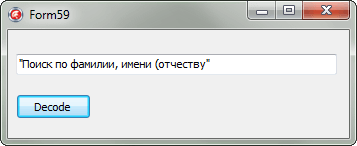Delphi декодировать JSON / UTF8 экранированный текст
Я пишу модуль для сложного приложения, и мой модуль должен обрабатывать ответ json, возвращаемый веб-сервером. Итак, моя проблема о том, как я могу декодировать такой текст:
\u041f\u043e\u0438\u0441\u043a \u043f\u043e \u0444\u0430\u043c\u0438\u043b\u0438\u0438, \u0438\u043c\u0435\u043d\u0438 (\u043e\u0442\u0447\u0435\u0441\u0442\u0432\u0443
Это кириллический текст, и Mozilla Firefox отображает его так, как должно быть. Как я могу обработать это, ребята? Я на Delphi 2010
2 ответа
Решение
Вы можете использовать DBXJSON блок, который включен в Delphi 2010
uses
DBXJSON;
const
JsonUt8 ='"\u041f\u043e\u0438\u0441\u043a \u043f\u043e \u0444\u0430\u043c\u0438\u043b\u0438\u0438, \u0438\u043c\u0435\u043d\u0438 (\u043e\u0442\u0447\u0435\u0441\u0442\u0432\u0443"';
procedure TForm59.Button1Click(Sender: TObject);
var
LJSONValue: TJSONValue;
begin
LJSONValue:=TJSONObject.ParseJSONValue(TEncoding.UTF8.GetBytes(JsonUt8),0);
Edit1.Text:=LJSONValue.ToString;
end;

Хорошо, ребята, вот полный код, который помог мне справиться с этой проблемой:
function Unescape(const s: AnsiString): string;
var
i: Integer;
j: Integer;
c: Integer;
begin
// Make result at least large enough. This prevents too many reallocs
SetLength(Result, Length(s));
i := 1;
j := 1;
while i <= Length(s) do begin
if s[i] = '\' then begin
if i < Length(s) then begin
// escaped backslash?
if s[i + 1] = '\' then begin
Result[j] := '\';
inc(i, 2);
end
// convert hex number to WideChar
else if (s[i + 1] = 'u') and (i + 1 + 4 <= Length(s))
and TryStrToInt('$' + string(Copy(s, i + 2, 4)), c) then begin
inc(i, 6);
Result[j] := WideChar(c);
end else begin
raise Exception.CreateFmt('Invalid code at position %d', [i]);
end;
end else begin
raise Exception.Create('Unexpected end of string');
end;
end else begin
Result[j] := WideChar(s[i]);
inc(i);
end;
inc(j);
end;
// Trim result in case we reserved too much space
SetLength(Result, j - 1);
end;
const
NormalizationC = 1;
function NormalizeString(NormForm: Integer; lpSrcString: PWideChar; cwSrcLength: Integer;
lpDstString: PWideChar; cwDstLength: Integer): Integer; stdcall; external 'Normaliz.dll';
function Normalize(const s: string): string;
var
newLength: integer;
begin
// in NormalizationC mode the result string won't grow longer than the input string
SetLength(Result, Length(s));
newLength := NormalizeString(NormalizationC, PChar(s), Length(s), PChar(Result), Length(Result));
SetLength(Result, newLength);
end;
function UnescapeAndNormalize(const s: AnsiString): string;
begin
Result := Normalize(Unescape(s));
end;
Код украден из этого ответа
Если кому-то понадобится простая функция для декодирования экранированной строки JSON:
function JSONUnescape(const Source: string; CRLF: string = #13#10): string;
const
ESCAPE_CHAR = '\';
QUOTE_CHAR = '"';
EXCEPTION_FMT = 'Invalid escape at position %d';
var
EscapeCharPos, TempPos: Integer;
Temp: string;
IsQuotedString: Boolean;
begin
result := '';
IsQuotedString := (Source[1] = QUOTE_CHAR) and
(Source[Length(Source)] = QUOTE_CHAR);
EscapeCharPos := Pos(ESCAPE_CHAR, Source);
TempPos := 1;
while EscapeCharPos > 0 do
begin
result := result + Copy(Source, TempPos, EscapeCharPos - TempPos);
TempPos := EscapeCharPos;
if EscapeCharPos < Length(Source) - Integer(IsQuotedString) then
case Source[EscapeCharPos + 1] of
't':
Temp := #9;
'n':
Temp := CRLF;
'\':
Temp := '\';
'"':
Temp := '"';
'u':
begin
if EscapeCharPos + 4 < Length(Source) - Integer(IsQuotedString) then
Temp := Chr(StrToInt('$' + Copy(Source, EscapeCharPos + 2, 4)))
else
raise Exception.Create(Format(EXCEPTION_FMT, [EscapeCharPos]));
Inc(TempPos, 4);
end;
else
raise Exception.Create(Format(EXCEPTION_FMT, [EscapeCharPos]));
end
else
raise Exception.Create(Format(EXCEPTION_FMT, [EscapeCharPos]));
Inc(TempPos, 2);
result := result + Temp;
EscapeCharPos := Pos(ESCAPE_CHAR, Source, TempPos);
end;
result := result + Copy(Source, TempPos, Length(Source) - TempPos + 1);
end;
Применение:
JSONUnescape('\u2764Love Delphi\u2764');
// Returns '❤Love Delphi❤'
JSONUnescape('"\u2764Love\tDelphi\u2764"');
// Returns '"❤Love Delphi❤"';
JSONUnescape('\\\Invalid escaped text');
// Raises and exception 'Invalid escape at position 3'